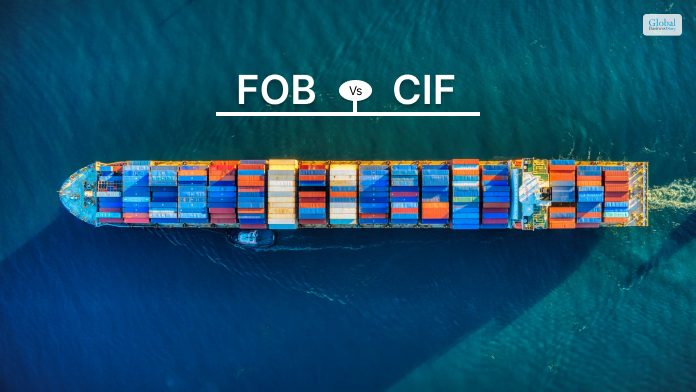FOB vs CIF: What Are The Differences?

FOB vs CIF: What are the differences between the two? – There are many differences between CIF and FOB. However, there is one principal difference. In FOB, the seller gives up responsibility for the goods once they are loaded onto the ship. However, in a CIF agreement, the seller has the responsibility for the goods until they reach the destination port. After that, the buyer assumes responsibility.
FOB vs CIF: A General Overview Of Shipping Agreements
According to Investopedia,
“Cost, insurance, and freight (CIF) and free on board (FOB) are international shipping agreements used in the transportation of goods between buyers and sellers. They are among the most common of the 11 international commerce terms (Incoterms), which were established by the International Chamber of Commerce (ICC) in 1936.”
Although the definitions of FOB and CIF differ with countries, both contracts contain details on origin and destination information. These data help in determining the beginning and end of liabilities. Apart from that, these pieces of information also outline the responsibilities of both buyers and sellers based on scenarios.
What Is Free On Board (FOB)?
Under the free-on-board (FOB) agreement, the supplier of the product does not take responsibility for the goods after they go into the shipping vessel. Hence, the supplier pays only for the transport of the good to the port and onto the vessel. As a result, the seller of the product has limited responsibilities for the goods under the contract.
After the goods go into the ship, the buyer of the product takes on the responsibility of the goods. The buyer takes full responsibility once the voyage starts. This includes transport, insurance, and other added fees. The buyer also pays for the unloading of the goods.
What Is Cost, Insurance, And Freight (CIF)?
Sellers use this technique mostly during large deliveries, especially for oversized goods that they ship by sea. The seller of the good takes responsibility for the good until it is delivered to the buyer’s port. The buyer assumes full responsibility for the goods as soon as it reaches the destination port.
Hence, if there are extra costs after the good reaches the destination port, the buyer will need to take responsibility for the same. After the payment, the transport service transfers the documentation for the goods over to the buyer.
FOB vs CIF: Major Pros And Cons
According to an article on Alibaba.com,
“With a CIF agreement, the seller is liable for the goods during transit, and with a FOB, the buyer is liable for the goods during transit. […] Generally, FOB is considered a more cost-effective approach. This is because buyers can make more cost-effective decisions about the shipment, such as buying the minimum insurance policy or going with a lower-cost freight company since they are in control.”
The following are the major pros and cons of FOB and CIF that you must know:
Pros And Cons Of Free On Board (FOB)
Here are the major pros of FOB that you will benefit from:
- The buyer of the product has more control over the delivery process.
- It is possible for the buyer to make various cost-effective decisions in some cases.
- The seller does not have to take responsibility for added costs.
Here are the major cons of FOB that you need to be aware of:
- Since the buyer has more responsibilities, the individual will need to deal with added costs if necessary.
- If the goods are damaged during transit, the seller is not responsible for that. This might send the buyer into an absurd situation.
Pros And Cons Of Cost, Insurance, And Freight (CIF)
Here are the major pros of CIF that you will benefit from:
- The seller has more control over the goods delivered to the customer.
- Also, the buyer of the product has little to no responsibility when it comes to the delivery of the product.
- The buyer gets a more seamless experience with the CIF process. As a result, the delivery process is less stressful for the buyer.
- As the buyer is getting more convenient with this process, it gives the seller a certain advantage over its competitors.
Here are the major cons of CIF that you need to be aware of:
- The seller has to take full responsibility for the damage to goods in transit.
- Buyers of the product have little to no control over the cost of the delivery process.
- There can be additional costs for sellers. This raises the costs of the goods at the time of delivery.
FOB vs CIF: Which Is The Best One To Buy?
During international shipping, most companies opt for either Free on Board (FOB) or Cost, Insurance, and Freight (CIF) agreements.
According to Investopedia,
“Inexperienced buyers typically prefer CIF, which places much of the shipping responsibility on the seller, including shipping costs, insurance, and freight to the destination port, while giving the buyer greater convenience. However, because the seller takes on more risk and responsibility, CIF often comes with a higher cost.”
Basically, in CIF, the seller of the product takes care of almost everything up to the final delivery at the destination port of the buyer.
On the other hand, the ones that have enough experience in international shipping tend to prefer FOB. This is because they have more control over the goods in this case. When the goods leave the ship, the responsibility for the goods goes to the buyers. The seller considers the goods as delivered once they clear the goods for export and load them onto the shipping vessel.
Apart from that, the FOB also offers flexibility over logistical details. These are to learn the needs of the buyer and to lower the costs since the seller cannot negotiate directly with shipping companies.
On a side note, the scale and expertise of the company also determine the choice between FOB and CIF.
Wrapping Up
FOB vs CIF: Hope this article was helpful enough to provide accurate information. You can see from the article that, in general, sellers choose FOB more than CIF. However, if it is a big item and you want to have more control as a seller, choose CIF. Consider sharing your ideas and opinions with us in the comments section below.
Explore More Finance By Clicking Below!!













